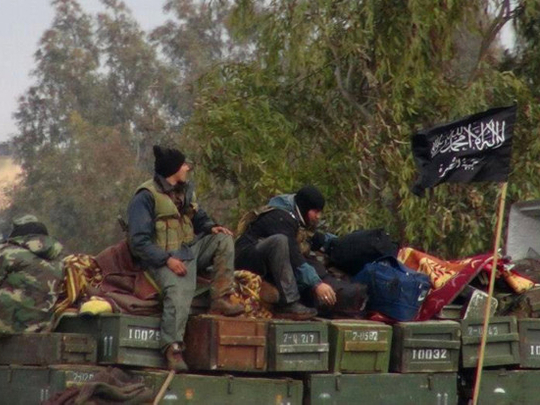
Dubai: The writing on the wall is that Al Qaida is returning and will repeat in Syria the same bloody scenario it implemented in Iraq few years back.
Last week’s announcement by the head of the jihadist Al Nusra Syrian group pledging allegiance to the Al Qaida leader, experts say, will have great ramifications on the course of the battles in Syria.
Some experts believe it showed the urgent need to support other “pro-democracy groups in the Syrian opposition” in their fighting to topple the regime of Bashar Al Assad.
Others say the announcement could lead to horrifying developments among the Syrian people themselves. And some others say regional and international countries will revaluate their positions and reassess their support to different Syrian opposition groups.
But all the scenarios are grim in a country locked in violent developments for more than two years, said experts in extremist groups. They noted that Al Qaida has not disappeared in the first place to come back.
“The golden rule to realise in the rising and falling of Al Qaida is that the group is a strategic ally to chaos,” said Mohammad Abu-Roman, an expert in Islamic groups and a researcher at the Strategic Studies Centre at Jordan University. “Wherever there is chaos and the state is weakened and is collapsing and crumbling, Al Qaida appears actively in that country,” he added to Gulf News.
Apart from the instability and insecurity, Noman Benotman, President of Quilliam, a counter-extremism think-tank based in London, said Al Qaida has been looking for an opportunity to appear in Syria.
“Al Qaida’s ambitions in Syria goes back to 2006, when Atiyah Abdul Rahman made it clear that he wishes Al Qaida will play a role in Bilad Al Sham (a historical title that refers to what is known today as Syria).” Benotman said Abdul Rahman was commenting on why the group doesn’t take its battle from Iraq to Syria.
Abdul Rahman, from Libya, was a senior leader in Al Qaida until he was killed in a US drone strike in 2011.
Throughout the past months, there were suspicions that foreign fighters are among the ranks of the Syrian opposition group of Jabhat Al Nusra, which was listed by the US on the terrorism list several months back.
The speculations were continuously denied until last week, when the head of the extremist Syrian group, Abu Mohammad Al Jawlani, declared his support to Ayman Al Zawahiri, chief of Al Qaida, the epitome of global terrorism.
“This will have catastrophic ramifications,” said Benotman. The analyst, based in London, himself was a fighter in the mid-80’s in Afghanistan during the conflict with the Soviet Union. Benotman, a Libyan, said at the time he had adopted radical Islam and formed the Libyan Islamic Fighting group. He travelled to Sudan and established close links with Al Qaida leaders. In the mid-90’s he settled in London and started “distancing himself from Islamism” according to the website of his think-tank.
“The international community, including regional countries, will reassess their policies and previous decisions in supporting the opposition,” Benotman told Gulf News. “Now, there is a big international and legal predicament. Supporting part of Al Qaida means clearly you support terrorism,” and this is evidently against international law and UN Security Council resolutions.
Different Syrian opposition groups will be required to declare distancing themselves from Jabhat Al Nusra, he continued, experts noted.
Syria’s neighbours will scrutinize their monitoring procedures along their borders with Syria, they added.
Turkey, for example, has blacklisted some 40 Libyans believed to be among the foreign fighters in Syria, according to Benotman.
And in Syria, there will be more fighting between Al Qaida and different Syrian opposition groups, as “Al Qaida will attempt to impose its agenda on the areas that will be out of the control of [President Bashar al Assad’s] regime,” said Abu Roman. “This will lead to a scenario similar to the Iraqi case during 2007 and 2009,” he added.
The similarity of the Syrian case with the Iraqi one will be in the ferocity of [internal] fighting,” Benotman added.
Some of Syria’s neighbours, including Saudi Arabia and Jordan, will boost their support to the Syria Free Army to avoid Al Qaida fortifying in Syria, Benotman said. Supporting pro-democracy forces should take into consideration the Muslim Brotherhood as “an effective and influential” element and “present them as the Islamic face in the opposition which reflect all spectrums of Syrian society,” Benotman noted.
Other global powers will realise the urgency of ending the Syrian crisis also to avoid the strengthening of Al Qaida in Syria, experts said. They point to the recent American-Russian meeting in London in which the two powers called for dialogue between the regime and opposition in Syria to end the current crisis.
“My information is that there is a semi-agreement that dialogue is the main solution, but the problem is who will stay and who will go,” Benotman said. “The opposition has a list of 148 names of people, including Bashar Al Assad, who should not be included in any future political process in the country, while the rest of the Al Ba’ath party will not be excluded and dissolved like the Iraqi case.”
The other option will be the establishment of an Islamic regime, and a “continuation of the struggle with superpowers, such as the US, or the regional powers, such as Iran and Shiite groups,” said Abu-Roman.











